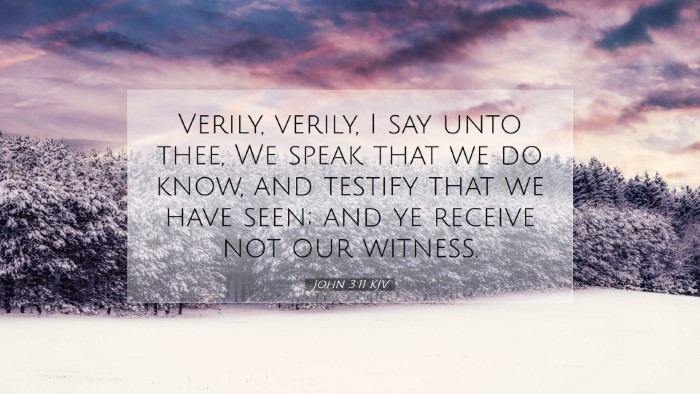Commentary on John 3:11
Bible Verse: John 3:11 - "Verily, verily, I say unto thee, We speak that we do know, and testify that we have seen; and ye receive not our witness."
Introduction
The passage found in John 3:11 is a profound statement made by the Lord Jesus Christ during His discourse with Nicodemus. This verse encapsulates fundamental aspects of Christian witness and the divine authority of Christ’s assertions. Understanding this passage is crucial for pastors, students, theologians, and Bible scholars as it lays the basis for recognizing the nature of divine testimony and human reception of truth.
Contextual Analysis
This verse falls within a broader context where Jesus explains the necessity of spiritual rebirth. It serves as a pivotal point where Jesus transitions from discussing earthly truths to heavenly realities. Nicodemus, a ruler of the Jews, struggles with Jesus’ teachings, indicative of the general resistance to divine revelation.
Historical Background
Nicodemus represents a segment of Jewish society that held on to traditional understandings of the law and expected Messiah to bring political and social renewal. Jesus challenges these expectations by introducing themes of spiritual awakening and regeneration, central to the new covenant.
Theological Insights
This verse signifies Jesus' confidence in His divine mission and the veracity of His message. Here are extracted theological insights:
-
Authority of Christ’s Testimony:
According to Matthew Henry, the repeated use of "verily" emphasizes the certainty and truthfulness of Christ's words. He asserts that what Christ speaks is grounded in personal experience and divine knowledge.
-
The Nature of Spiritual Knowledge:
Albert Barnes notes that the knowledge Jesus speaks of is not mere intellectual assent but experiential and transformative. He portrays Jesus' knowledge as derived from His unique relationship with the Father, affirming the divine source of revelation.
-
Resistance to Truth:
Adam Clarke emphasizes the tragic irony in the verse. Despite the profound wisdom and insight Jesus offers, the spiritual leaders of Israel fail to recognize and accept His words. Clarke's commentary highlights the broader theme of rejection faced by prophetic voices throughout scripture.
Practical Applications
The teachings of John 3:11 carry profound implications for Christian living and ministry:
-
Emphasis on Spiritual Understanding:
Leaders are reminded that authority in ministry comes not from personal charisma or intellect but from an authentic encounter with Christ and His truths. This inspires humility in the preaching of the gospel.
-
Expectation of Resistance:
Pastors and church leaders should be cognizant that just as Christ faced skepticism, they too will encounter resistance when proclaiming the fullness of the gospel. This underscores the need for patience, prayer, and reliance on the Holy Spirit.
-
The Importance of Testimony:
Believers are called to testify of the truth they have experienced in Christ. Like Jesus, their testimony should be rooted in personal transformation, encouraging others to seek the same renewal.
Conclusion
John 3:11 invites a deeper exploration of the veracity of Christ’s message and the human propensity toward disbelief. The insights drawn from historical context and theological metaphors offer significant import for the church today. By recognizing the divine authority of Christ’s words and the persistent need to bear witness to this truth, believers can cultivate vibrant, transformative faith that reflects the heart of the gospel.


